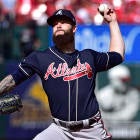On Wednesday, the Atlanta Braves will play the St. Louis Cardinals in Game 5 of their National League Divisional Series. The winner will advance to the NL Championship Series, where they'll play either the Los Angeles Dodgers or Washington Nationals for the pennant. For the full playoff schedule, click here.
One reason the Braves are in this position is because back in June they signed free-agent starter Dallas Keuchel to a one-year deal worth $13 million. Keuchel, who posted a 121 ERA+ in 19 starts for the Braves, remained on the market until midseason for a variety of reasons, including teams' reluctance to meet his salary demands and their protectiveness of draft picks.
Keuchel talked with ESPN over the weekend about his impending return to free agency this winter, and made a point of criticizing the draft-pick compensation aspect. Take a look:
"This is whole draft-pick compensation thing went from a throw-in for a team losing a player, to is he really a free agent now? How can you be free if there is a draft pick attached to you? And why do they value draft picks so much when the percentage of picks who make the league, and are better than you, is what, like .01 percent? There are so many things wrong."
Keuchel has a point -- and remember, he didn't sign until after the draft, so even the Braves were unwilling to sacrifice a draft pick in order to secure his services.
For those unfamiliar with the process, the collective bargaining agreement permits teams to collect draft-pick compensation on impending free agents by extending them a "qualifying offer" -- a one-year pact worth the average salary of the top 125 highest-paid players. There are restrictions on who can receive said offer. Players can't receive it more than once in their careers, and must have spent the entire season with the team in question, but any player who declines the offer could then cost his signing team draft picks, depending on when they sign and a slew of conditions pertaining to their luxury tax and revenue sharing statuses.
Basically, it's a convoluted mess that reveals the stated intent of draft-pick compensation -- rewarding teams for developing and/or employing quality players -- isn't the actual intent. Rather, the real motivation seems to be suppressing salaries -- by baking the cost of a draft pick into contract negotiations -- and giving teams a built-in excuse for not spending. A team claiming it wants to build the right way, through the draft, is really saying it prefers the chance to play the lottery for the honor of employing cheap talent down the road, as opposed to paying market value for it now. That thinking just sounds better when it's dressed up in the appropriate jargon.
To put it another way, if the purpose of draft-pick compensation was to reward teams for manufacturing good players, then why would the signing team's financial state matter? "To assist competitive balance," right? Except that's supposedly -- and supposedly is the right term, given the lack of evidence supporting it -- the job of the luxury tax and revenue sharing.
Besides, if baseball wanted to improve competitive balance, wouldn't it make more sense to stake compensation on the previous year's record? Perhaps make it so any team who didn't make the postseason would be able to sign free agents without sacrificing a pick -- that way, the bad clubs can double-dip in free agency and the draft rather than bank on only one path.
It's fair to wonder if and/or why teams should be punished for signing the best free agents, anyway -- other leagues do fine without -- and especially now, with the league treating the luxury tax as an unofficial salary cap. When a franchise as wealthy and powerful as the Boston Red Sox is floating the idea of trading Mookie Betts, one of the game's best, to avoid a trifling overage fee, then it's time to reconsider the league's priorities and ask what's really important.
All of this speaks to Keuchel's point: Draft-pick compensation is now a weapon wielded against players. It suppresses their salaries, it limits their employment opportunities, and in special cases -- like his -- it eats away half a season just so teams can crow about sustainability.
Keep that in mind as the winter nears -- and don't be surprised if this time next year someone else is making the same points.


















